Angela Ackerman's Blog: Writers Helping Writers, page 56
January 13, 2022
How Memoir and Autobiography Differ
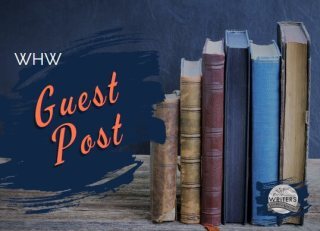
By Liz Alterman
A few years ago, I told a friend that I���d nearly finished writing a memoir. She knew that it focused on the period my husband and I���both in our mid-to-late forties���were laid off simultaneously and struggling to get our careers and marriage back on track. Yet that didn’t stop her from suggesting ���a surprise pregnancy cliffhanger ending.���
That���s when it occurred to me that not everyone knows that memoir, derived from the French m��moire, meaning ���memory,��� is a work of nonfiction. Even when people are aware that this genre is rooted in fact, they often think it is interchangeable with autobiography.
While these first-person narratives have plenty in common, they���re also quite different. Where do they overlap and how are they dissimilar? Let���s take a look.
Both Tell the Story of the Author���s LifeAutobiographies usually unfold in chronological order, beginning from early childhood and continuing through present day. They can certainly include flashbacks as the story evolves, but most follow a linear path.

Memoir, on the other hand, typically focuses on a snapshot in time or a life-defining period rather than spanning the author���s entire life. They shine a spotlight on an aspect, such as an illness, an unusual childhood or career, and include reflections on how those circumstances shaped them, often culminating in a lesson learned or a message that leaves readers feeling their time investment was worthwhile.
Memoir can be a collection of essays unified by a common theme or occurring within a set window of time, like Annabelle Gurwitch���s You���re Leaving When? Adventures in Downward Mobility, which centers around the author���s living situation after her marriage ends and her child leaves for college. Memoir can also told through verse as Jacqueline Woodson does in her National Book Award winner Brown Girl Dreaming.
Both Seek to EnlightenAutobiographies are crafted to illuminate the early beginnings, education, and career of a famous person, such as an historical figure. Examples include The Story of My Life by Helen Keller, which details the author and lecturer���s challenges and journey to overcome them, or The Autobiography of Benjamin Franklin, which showcases the inventor and founding father���s wit and irreverent wisdom as he lays out his life story.
Memoirs can be written by anyone who believes they have a tale to tell. Consider The Bright Hour: A Memoir of Living and Dying by Nina Riggs, an American poet who shares her final months as a mother facing terminal cancer, or The Glass Castle by Jeanette Walls, chronicling the author���s far-from-ordinary childhood which fosters a lifelong resilience.
Autobiographies Focus on Facts While Memoirs Focus on FeelingWhile many autobiographies showcase the author���s character and personality through the tone and events described, they may have a more journalistic feel, covering all the facts readers would hope to learn about the subject.
Memoirs embody a more voice-driven approach, engaging the reader on a personal level. They���re not as date-time-and-place driven, but rather explore scenes and memories that hang together to support a larger message or theme that offers readers insight into their lives.
How Do You Decide?If you���d like to share your life story and are wondering which genre���autobiography or memoir���better serves your purpose, there are a few ways to determine the right option.
Is there a single incident that set others in motion that molded you into the person you are today? Do you have a theme or message you wish to impart through a collection of vignettes? If your answer is yes, memoir would work well.
Memoir requires that the author dig deep emotionally so readers can relate and empathize. Writing a memoir can serve as a catharsis or a way to come to terms with a difficult time or situation, which can be healing. Pulitzer Prize-winning author of Angela’s Ashes Frank McCourttold NPR���s Terry Gross how writing his beloved memoir shifted his perspective.
���I���ve gone back [to Ireland] a number of times, but always with a chip on my shoulder, a sense of anger. I got a lot of the stuff out of my system by writing the book, and I feel much more comfortable������ McCourt explained.
If you���re more interested in preserving your history in an orderly timeline with an array of anecdotes at various ages and stages and enjoy research and fact-checking dates, try autobiography.
You can also ask yourself: “What���s my goal?��� Do you hope to publish this story or share it only with friends and family? Considering your target audience may help you decide the better vehicle for your story.
Whether you choose to write an autobiography or a memoir, it will likely require a great deal of time and effort, so starting out with a clear idea of which style best suits your narrative can help serve as a roadmap. Of course, that doesn���t mean you can���t change course once you begin.
Either way, capturing your life story is a way to preserve your legacy and enlighten readers at the same time.

Liz Alterman’s work can be found in The New York Times, The Washington Post, Parents, McSweeney’s Internet Tendency, and other publications. She is the author of a young adult novel, He’ll Be Waiting, a domestic suspense novel, The Perfect Neighborhood, and Sad Sacked, a memoir that chronicles the period she and her husband were mutually unemployed. Liz lives in New Jersey with her husband and three sons. When she isn’t writing, Liz spends most days reading, microwaving the same cup of coffee, and looking up synonyms. For more of her writing, visit her website .
The post How Memoir and Autobiography Differ appeared first on WRITERS HELPING WRITERS��.
January 11, 2022
Writers, Grab a Knife: How To Kill Your Darlings
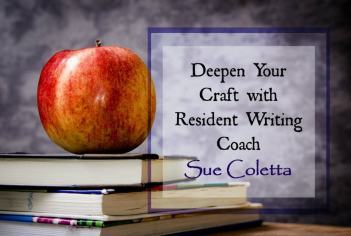
By Sue Coletta
Good writing involves rewriting. An essential part of rewriting is combing through the first draft and carving out material that isn���t essential. When we edit out nonessentials, we are killing our darlings.
What is a Darling?Darlings are words, phrases, sentences, paragraphs, and even whole scenes that we���re often most proud of and attached to. We love them to the point that we almost don���t care if they muddy the storyline. We worked hard and want to keep our darlings right where they are, thank you. We should be able to keep whatever we want, right?
Wrong.
A writer needs to consider the reader. When we disregard the reader���s needs for the sake of our own, we fail. If that sounds harsh, consider a world without readers.
How To Identify a Darling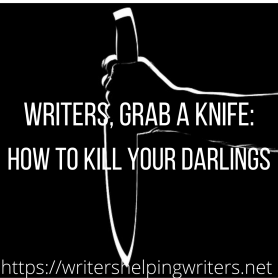
If you���re desperately in love with a word/sentence/paragraph/page/scene, but you keep fighting with it to make it work, it���s a darling.
If your beta readers are confused by it, but the thought of losing it shreds your soul, it���s a darling.
If you have a scene that���s your best writing ever but it feels out-of-place, like it belongs in a different book, it���s a darling.
If you can cut the word/sentence/paragraph/page/scene without disrupting the story, it���s a darling.
One of the first places to look is at filler words.
Darling Filler WordsJustThis darling should almost always be murdered.
Original: I just couldn���t say goodbye.
Rewrite: I couldn���t bear to say goodbye.
This darling litters many first drafts, but it can often be killed without any harm to the sentence.
Original: I believe that all writers kill their darlings.
Rewrite: I believe all writers kill their darlings.
The original and rewrite have a second darling. Did you catch it?
Final Rewrite: All writers kill their darlings.
���Believe��� in this context is a telling word. Any time we tell the reader things like ���I thought��� or ���He knew��� or ���She felt��� or ���I believe��� we slip out of deep POV. Thus, the little darling must die.
SoOriginal: So, this huge guy glared at me in the coffee line.
Rewrite: An enormous dude with linebacker shoulders glared at me in the coffee line.
Confession? I use ���so��� all the time online, but that doesn���t mean I leave the filler in my work. The only exception is if it���s used with purpose, like as a character cue word.
ReallyOriginal: She broke up with him. He still really loved her.
Sometimes killing your darlings means combining/rewording sentences rather than merely removing filler.
Rewrite: When she severed their relationship, his heart stalled.
VeryHere���s another meaningless word. Be ruthless with this darling.
Original: He made me very happy.
Rewrite: When he neared, my skin tingled.
The way to determine if ���of��� is needed is by reading the sentence with and without it. Does the sentence still make sense?
Original: She bolted out of the door.
Rewrite: She bolted out the door.
Original: He rose up from the table.
Rewrite: He rose from the table.
Original: He sat down on the couch.
Rewrite: He sat on the couch.
I���m not saying we should never use ���and��� or ���but��� to start a sentence, though editors might disagree. Depends on context.
Original: He died. And I���m heartbroken.
Rewrite: When he died, my soul shattered.
Also search for places where ���but��� is used to connect two sentences. Can you combine them into one sentence without losing the meaning?
Original: He moved out of state, but I miss him. He was the most caring man I���d ever met.
Rewrite: The most caring man I���d ever met moved out of state. I miss him���miss us.
Want/wanted is another telling word. It must die to preserve deep POV.

Original: I really wanted the chocolate cake.
Rewrite: I drooled over the chocolate cake. One bite. What could it hurt?
The reason came/went is filler is because it���s not specific enough.
Original: I went to the store to buy my favorite ice cream.
Rewrite: I raced to Marco���s General Store to buy salted caramel ice cream, my tastebuds cheering me on.
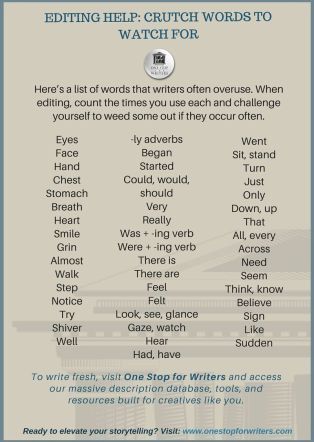
Too many ���had��� words give the reader the impression the action took place prior to the main storyline. As a guide, used once in a sentence puts the action in past tense. Twice is repetitive and clutters the writing. Also, if it���s clear the action is in the past, it can often be omitted.
Original: I had gazed at the painting for hours and the eyes didn���t move.
Rewrite: For hours I gazed at the painting and the eyes never wavered.
Looking for more words that are often overused? Download this Editing Help: Crutch Words Checklist.
Paragraph/Page/Scene DarlingsIt���s not easy to delete a full page or an entire scene or chapter. I understand. Still, we must kill our darlings, no matter how much it stings. To lessen the pain, save the deleted passages in a separate file marked ���Darling Graveyard��� or equivalent. Pick a title you���ll remember. You might be able to breathe new life into that dead darling for another book. Plus, it���ll lessen the sting. You may never use the deleted paragraph/page/scene, but at least it���s available.
How To Identify a Scene DarlingDoes the scene have a purpose? If no, kill that darling.
Does the scene play well with others ��� does it interact with the scenes before and after it? If no, kill that darling.
Does the scene drive the plot forward or benefit the storyline? If no, kill that darling.
What happens if you delete the scene? Did the story change? If no, kill that pesky darling.
Redundancy DarlingsOne of the most common reasons to kill your darlings is if we���ve overemphasized in some way. Trust the reader. Don���t beat them over the head with this or that. Resist the urge to over-explain.
Avoid purple prose. Good writing is concise and to the point. Overly cute or witty turns of phrase must die. You may love a phrase or sentence that sounds beautiful to your ear, but it has no purpose. Sorry but that pretty darling weakens your writing. Be ruthless and kill it.
Darling CharactersDo you need forty-five characters? Of course not. Try combining two or three characters into one. Are they more fleshed out and real now? Yes? Great! Killing the darling characters benefited the storyline.
Darling Subplots/TwistsIf we have too many subplots and/or crazy twists, we risk overwhelming and/or distracting the reader. Chances are one or two can go without changing the main plot. Save the cut scenes in the Darling Graveyard. They may be perfect for a different story.
Think of killing your darlings as a good thing. It means you���re tightening your prose, laser-focused on the plot and characters. In short, you���re giving your work the best possible chance of success. 
 Sue Coletta
Sue ColettaResident Writing Coach
Sue Coletta is an award-winning crime writer. Feedspot and Expertido.org named her Murder Blog as “Best 100 Crime Blogs on the Net” (2018-2021). She also blogs at the popular Kill Zone, writes two psychological thriller series (Tirgearr Publishing), and true crime/narrative nonfiction (Rowman & Littlefield Group, Inc.).
Sue also appeared on the Emmy award-winning true crime series, Storm of Suspicion and will be teaching an advanced education course on serial killers for Foothills Regional (CT).��
Website | Facebook | Twitter | Amazon | Goodreads | BookBub | Instagram | YouTube
The post Writers, Grab a Knife: How To Kill Your Darlings appeared first on WRITERS HELPING WRITERS��.
January 8, 2022
Relationship Thesaurus Entry: Headmaster and Student
Successful stories are driven by authentic and interesting characters, so it���s important to craft them carefully. But characters don���t usually exist in a vacuum; throughout the course of your story, they���ll live, work, play, and fight with other cast members. Some of those relationships are positive and supportive, pushing the protagonist to positive growth and helping them achieve their goals. Other relationships do exactly the opposite, derailing your character���s confidence and self-worth or they cause friction and conflict that leads to fallout and disruption. Many relationships hover somewhere in the middle. A balanced story will require a mix of these dynamics.
The purpose of this thesaurus is to encourage you to explore the kinds of relationships that might be good for your story and figure out what each might look like. Think about what a character needs (good and bad), and build a network of connections for him or her that will challenge them, showcase their innermost qualities, and bind readers to their relationship trials and triumphs.
Headmaster and Student
Description:
A headmaster is the primary administrative figure at a school, overseeing the academic experience for all students. The degrees of separation between these individuals often make it a superficial or transactional relationship., but with a little planning and outside-of-the-box thinking, it can become much more interesting.
Relationship Dynamics
Below are a wide range of dynamics that may accompany this relationship. Use the ideas that suit your story and work best for your characters to bring about and/or resolve the necessary conflict.
A headmaster taking great pains to make sure the student succeeds
The student respecting the headmaster���s position of authority
A headmaster actively mentoring a student
A headmaster taking special interest in a student because of a relationship with the student’s parents (they’re friends, donors, etc.)
A relationship in which the headmaster is also the student’s parent, generating resentment, awkwardness, friction, or rebellion
A headmaster and student with a purely academic relationship (only interacting when there are educational questions or concerns)
A cruel or unbending headmaster who rules the student with an iron fist
An entitled student believing the headmaster should give them what they want or have “earned”
A headmaster having low expectations for the student and being quick to believe the worst about him or her
A headmaster having unreasonably high expectations for the student
A student trying to ruin a headmaster���s career or make their professional life difficult
A headmaster being determined to remove the student from the school
A headmaster and student using each other to get what they want
A student blackmailing the headmaster
Challenges That Could Threaten The Status Quo
The student getting caught breaking a rule or violating a policy
The school being embroiled in a scandal
The headmaster having to take a leave of absence and an interim taking his or her place
The student criticizing the headmaster or school online
The student having to repeat a grade
The student playing a prank on the headmaster
The student suffering a trauma that triggers PTSD, depression, or another mental challenge
Either party discovering sensitive information about the other
The headmaster showing favoritism to the student in a very public way
The student���s parent being hired to work at the school
The parties discovering ties outside of the school environment
The headmaster suspecting that the student is suffering from neglect or abuse at home
The student developing a relationship with the headmaster’s child
The student���s family pulling their financial support from the school
The student’s financial situation changing, making it difficult for them to afford tuition
The student becoming an athletic or arts phenom, giving them more power
Conflicting Desires that Can Impair the Relationship
Either party wanting to control the other
The student wanting a different academic path than the headmaster wants for them
The headmaster wanting a punishment for the student that the student deems unfair
Either party wanting different levels or kinds of communication
One party wanting a shared secret to remain hidden
One party wanting to change schools while the other wants them to stay
The headmaster wanting information about another student that the character isn’t willing to share
Either party wanting an inappropriate relationship
The student wanting the headmaster to provide support or intervene in a private matter while the headmaster wants to remain neutral
Clashing Personality Trait Combinations
Independent and Needy, Judgmental and Oversensitive, Responsible and Uncooperative, Trusting and Manipulative, Nurturing and Withdrawn, Controlling and Rebellious, Persuasive and Weak-Willed
Negative Outcomes of Friction
The student being suspended or expelled
The headmaster losing their job
Anxiety and frustration over not feeling supported in their respective roles
Either party feeling misunderstood in their efforts to please and support the other person
Feeling vulnerable at the hands of the other party
The student dropping out of school
The headmaster’s career or reputation being ruined
Arguing and fighting
Decreased trust
The student experiencing an abuse of power
The student failing academically
Fictional Scenarios That Could Turn These Characters into Allies
The headmaster being able to help the student with personal struggles
The student influencing peers to support the headmaster
Coming together to plan a project or fundraiser that benefits the school
The headmaster becoming a mentor for the student
The student bringing information and insight to the headmaster that they might not otherwise get
Sharing a traumatic experience together, such as school shooting or natural disaster
Ways This Relationship May Lead to Positive Change
Each party learning to respect the other’s position
The student growing and maturing under the guidance of the headmaster
The headmaster gaining a youthful perspective
The student finding an adult ally that they can trust
The headmaster finding deeper meaning in their professional life
The headmaster learning to accept feedback for improving the school
The student gaining a confidant
Themes and Symbols That Can Be Explored through This Relationship
A fall from grace, Alienation, A quest for knowledge, Betrayal, Borders, Coming of age, Crossroads, Danger, Deception, Depression, Disorder, Evil, Family, Freedom, Friendship, Greed, Health, Hope, Illness, Inflexibility, Innocence, Instability, Isolation, Journeys, Knowledge, Loss, Love, Obstacles, Order, Passage of time, Peace, Perseverance, Pride, Rebellion, Recognition, Refuge, Sacrifice, Stagnation, Suffering, Teamwork, Transformation, Unity, Violence, Vulnerability, Wealth
Other Relationship Thesaurus entries can be found here.
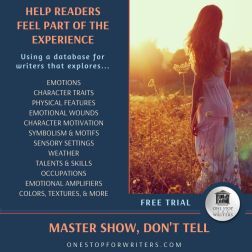 Need More Descriptive Help?
Need More Descriptive Help?While this thesaurus is still being developed, the rest of our descriptive collection (15 unique thesauri and growing) is accessible through the One Stop for Writers THESAURUS database.
If you like, swing by and check out the video walkthrough, and then give our Free Trial a spin.
The post Relationship Thesaurus Entry: Headmaster and Student appeared first on WRITERS HELPING WRITERS��.
January 6, 2022
4 Strategies to Help Writers Focus in a World of Distractions
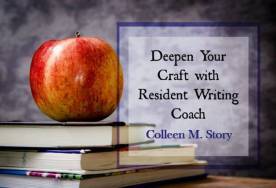
By Colleen M. Story
If you want to reach your writing goals this year, you���ve got to get rid of one thing: distractions.
They surround you at every turn, vying for your attention, and every time they succeed, they pull you away from what really matters���your writing.
This year, you don���t have to settle for less than what you want because of distractions. Try these four strategies to improve your focus and make your writing dreams come true.
1. Create a Focus-Inspiring Writing SpaceIt���s common to blame your lack of willpower when you allow distractions to disrupt your focus. But often the problem isn���t you���it���s the space you���re writing in.
Take a second look at your writing nook. Does it inspire focus while you���re writing, or does it easily allow distractions?
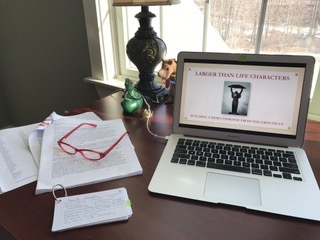
First, consider what���s nearby. If you���ve got your phone sitting on the desk, a television against the wall, or other people in the room, it���s going to be harder to focus.
This year, create a writing space that does not allow distractions. No phones, televisions, radios, or other people are allowed.
This may not be easy to do, particularly if you have limited space in your home. But creating a focus-inspired writing space is critical if you want to get your writing done. Consider alternatives like a quiet space in the basement, your parked car, or even a rented office space.
If you do have access to a private space in your home, spruce it up to be inspiring but not distracting. Make it a ���phone-free��� zone, so that you leave your phone out of it every time you walk into it. Then include pictures, knick-knacks, and colors that will help you sink into the dream world of your story and stay there until you���re ready to come out.
2. Create a Focus-Inspiring Reading ListHere���s something interesting: In a 2016 study, researchers found that what students read in college directly affected the level of writing they achieved���even more than writing instruction and frequency.
What you read can affect not only how you write, but how motivated you are. If you���re serious about finishing or publishing your book this year, increase your focus by carefully choosing your reading material.
First, read books in your genre. If you���re writing romance, read romance. Next, read books about writing. It will help increase your focus and your skills. Third, read books about building your platform and marketing your books.
And finally, read books that will motivate you to achieve, whatever those books may be. Some people are motivated by biographies of famous writers, while others prefer how-to or self-help books.
The goal is to feed your mind writing-related, inspiring information every day. By doing so, you���ll create a much more focus-oriented mindset toward your goals.
3. Spend Time With Others Who Will Help Increase Your FocusBe honest with yourself���after you spend time with your friends and family, do you feel more or less inspired to go after your writing goals?
Do you charge to your writing table and pound out the next chapter, or do you plop down in front of the television to watch a boring sitcom?
We all have people we enjoy spending time with who are likely to encourage distraction more than focus. But if this describes most people you spend time with, you could be hindering your writing progress.
This is the year to make a change. Seek out a writing group in your area. If there isn’t one, consider starting one yourself.
Then, find an editor or writing coach that will encourage you to focus on your writing. (Yes, it may cost money, but you���re worth the investment!) There���s nothing like an editor waiting on pages to inspire you to ignore distractions. If you���re not ready for an editor yet, partner with another writer who will be happy to read your material in exchange for you doing the same.
4. Create a Focus-Inspired Daily EnvironmentHere is where you can make the biggest impact on your writing dreams: your daily environment.
If you aren���t finding it easy to maintain a writing practice, something has to change. That something needs to be your environment.

Not your willpower. Not your discipline. Your environment.
You can have all the willpower in the world, but in the end, if your environment is not encouraging you to write, your goals will remain out of reach.
What you want to do is create the right conditions that will inspire you to write. Let���s look at one example. Jim has decided that he wants to write first thing every morning. To create an environment that will inspire him, he should:
Set up his writing nook the night before. Clear off the desk so it looks inviting the next morning, and stick an inspiring quote to his laptop.Schedule the coffee maker to make coffee (or tea!) 10 minutes before his writing time starts. Waking up to a pleasant aroma can encourage getting out of bed.Set the alarm to wake him gradually to music or a brightening light. (A gentle awakening inspires hypnagogia, that state between awake and sleep when the brain is most creative.)Place comfortable clothing by his bed that he can quickly slip into. Tuck his phone out of sight so he’s not tempted to check it until after his writing is done. Maybe hide the TV remote as well!Set out his dishes (and cookware if needed) for a tasty breakfast he can enjoy once his writing time is finished. (This will provide a reward for sticking with his routine.)You get the idea. The important thing is to make your environment work for you so that it’s as easy as possible to write when you want to. Make it nearly impossible to make another decision, and you’ll be more likely to follow through.
Note: For more help on setting meaningful and inspiring writing goals this year, see Colleen���s free report here!
 Colleen M. Story
Colleen M. StoryResident Writing Coach
Colleen M. Story inspires writers to overcome modern-day challenges and find creative fulfillment. Your Writing Matters helps writers overcome self-doubt and determine where writing fits in their lives. Writer Get Noticed! was the gold-medal winner in the Reader���s Favorite Book Awards. Overwhelmed Writer Rescue was named Book by Book Publicity���s Best Writing/Publishing Book in 2018, and her novel, Loreena���s Gift, was a Foreword Reviews��� INDIES Book of the Year Awards winner. Find out more at these sites:
Writing and Wellness | Life and Everything After | Teachable | Author Website | Twitter
The post 4 Strategies to Help Writers Focus in a World of Distractions appeared first on WRITERS HELPING WRITERS��.
January 3, 2022
A New Face at Writers Helping Writers
As you guys can probably guess, Becca and I have a lot on the go as we share businesses, books, software, and more. We teach, run this blog, manage multiple platforms, and do our own marketing. A question we are often asked is, “How do you do it?”

And the answer is usually…
“Oh, you know…we manage things the best we can.”Talk about ambiguous, right? And there’s a reason, because do we really want to say “managing” equates to sacrificing sleep, family time, and interests? Do we want to tell people we’re constantly triaging the to-do list because there will never be time to get it all, and feel like failures at times because of all the things we can’t get done?
No.
I know most of us are familiar with “managing.” We all try to juggle too much. Speaking for ourselves, these last two years of Covid-related business struggles has pushed us to the end of our abilities to “manage.” We’ve hit a wall, and hard.
Ironically in some ways it’s good that we did. It’s forced us to finally do what we should have done years ago: gotten help.
Which leads me to the wonderful Mindy Alyse Weiss!Awhile back I mentioned on Facebook that Becca and I were thinking about bringing on someone to help with Writers Helping Writers and who immediately reached out? Mindy Alyse Weiss.
Mindy is someone we’ve known for years, a fixture in kidlit writing circles. She’s always ready with kind words, support, and help. She has the same pay-it-forward mentality, love of the writing community, and passion for educating and empowering writers as Becca and I have, so we knew she’d be a great fit.
Mindy’s been working behind the scenes at Writers Helping Writers for a few months now, and it’s time to introduce her officially as our Resident Blog Wizard. She’ll be helping in a myriad of ways, including overseeing guest posts and helping with our Resident Writing Coach program. We couldn’t be happier.
A bit more about Mindy: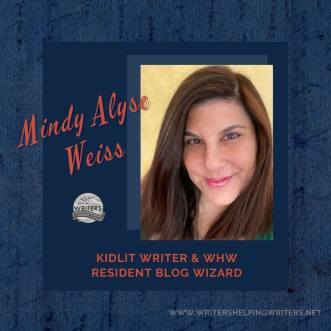
Mindy Alyse Weiss is a glitter-loving kid at heart. Writing, reading, and hanging out with other book-loving people is her air. She���s written many humorous middle grade novels and picture books, but also enjoys tapping into the challenging parts of her life so she can spread sunshine, hope, and show readers they aren���t alone.
Mindy loves giving back to the writing community. She���s a founding member and Administrator on the From the Mixed-Up Files���of Middle-Grade Authors blog, an SCBWI volunteer, and host of the PBParty chats, new draft challenge, and annual contest.
Mindy Alyse Weiss lives in Florida with her husband, two daughters, and rescue dog and cat. She adores animals and would adopt every homeless one if she could. She also loves chatting with other book-loving people on Twitter, Instagram, and Facebook���and seeing their adorable pet photos! She���s thrilled to be represented by Joyce Sweeney.
We’re very excited to have her here, and to have help at last. 
The post A New Face at Writers Helping Writers appeared first on WRITERS HELPING WRITERS��.
December 21, 2021
Time to Make Merry
Hi everyone! It’s that time of year when Becca and I trade our keyboards in for gingerbread and hot chocolate (mine spiked with alcohol, I assure you).

We just wanted to end the month by saying how proud we are to be members of the writing community. These last two years have been challenging, more so than any of us could have anticipated. It’s not been easy. And yet something else has come from it as well – an amazing display of resilience.
Thank you all for showing us strength, support, and kindness. You guys are amazing.
Have a wonderful holiday season, and we’ll see you in January!
Blessings to all,
Angela & Becca
The post Time to Make Merry appeared first on WRITERS HELPING WRITERS��.
December 16, 2021
How to Write a Compelling Antihero
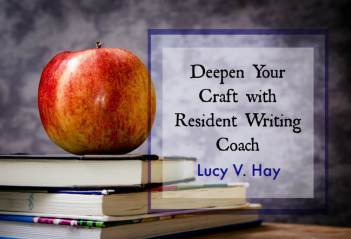
By Lucy V Hay
What is an Antihero?Heroes embody courage, perseverance and skill. They can easily turn into villains when they use their talents for personal gain. This means antiheroes are like their name suggests … a character that DOESN’T have or has twisted the classic hero attributes, for whatever reason.
Lots of writers believe antiheroes ���have��� to be protagonists, but this is not the case. An antihero can be ANY main character – protagonist, antagonist or even secondary – that has ‘gone wrong’ when it comes to being a hero.
Iconic AntiheroesIn I Am Pilgrim by Terry Hayes, our protagonist Pilgrim is contrasted with the antagonist, Saracen. Pilgrim is supposed to the ‘classic’ American spy thriller hero, whereas Saracen is the threat to the Western world from the so-called ‘Axis of Evil’.
As the story continues, it becomes clear the two are both not only antiheroes, but doppelg��ngers. They are the same men, but on opposite sides. In contrast to reader expectation, Pilgrim is arguably NOT the ‘good’ one, nor is Saracen the ‘bad’ one.
In the TV series Breaking Bad, Walter White’s arc is ‘Mr Chips becomes Scarface‘. Facing a terminal diagnosis for lung cancer, White’s intentions to provide for his family after his death are understandable and good. However, in doing this he descends onto a rocky road where he becomes a drug kingpin. NOT good!
In the Marvel movie Black Panther, Erik Killmonger is a genocidal murderer and wants to bring Wakanda down, whom he blames for his father’s death. He is evil, but he is right: Wakanda did him a terrible wrong. His own family abandoned him as a child to keep up appearances.
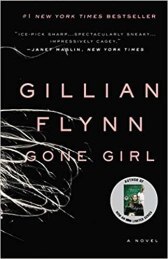
In Gone Girl by Gillian Flynn, Amy Dunne is the voice of spurned women everywhere. She discovers her husband Nick has betrayed her, so decides to take him down by utilizing society’s misogyny in her favor.
Amy proves she will stop at nothing to make him pay. Knowing most women are murdered by the men in their lives, she fakes her own disappearance and frames Nick.
In the TV series Sons of Anarchy, middle-aged matriarch Gemma Teller thinks of herself as a loving mother and facilitator of the motorcycle club SAMCRO.
Gemma tells herself she puts her son Jax Teller and his own sons first, plus she is a strong woman who has survived much hardship. Even so, in reality is she a liar, manipulator and even murdered Jax’s own father JT.
No More Comic Book VillainsGone are the days when villains and antagonists are ‘just’ evil. Whilst ‘comic book villains’ were often three-dimensional characters that disrupted everything because they wanted to, now antiheroes are much more complex as standard.
The age of the antihero has arrived very obviously in the screenwriting world thanks to what producers sometimes call ‘The Gone Girl Effect’.
Obviously, Amy Dunne is not the first female antihero/antagonist, but she made a huuuuuuuuge cultural impact. Thanks to her, the industry is finally open to complex female leads. This includes books as well.
But what are the key qualities of an antihero?
How to Write an Antihero1) Never underestimate the power of manipulation
The antihero has key qualities – both good and bad – that deserve attention when we are planning our characterization. An antihero will frequently prefer to use manipulation in the first instance. They may enjoy violence, or they may prefer not to get their hands dirty. Whatever the case, they tend not to go 0-60mph when trying to get what they want.
2) Use shock and awe
When antiheroes DO use violence (physical or verbal or both), they are frequently showy with it. This is because they know the power of shock and awe. They will confuse their enemies and leave them reeling.
This does not mean cheesy displays, but rather surprise tactics. This enables the antihero to shock their target into agreeing with them or giving them what them what they need.
3) The antihero thinks they are right (or they at least have ‘no choice’)
The antihero may lie to themselves, saying they are the ‘good guy really’. They may have no problem looking at piles of bodies in their wake (metaphorically or literally), or it may give them nightmares. They will continue regardless.
Alternatively, the antihero may literally be right, but their methods are wrong (again, literally or metaphorically). They will still kid themselves, saying they have ‘no choice’ but to continue in their path.
4) Ruthlessness is nothing personal
Antiheroes understand they must make sacrifices to get ahead. This may mean getting rid of allies in that bid for power. Though some may feel sorrow about this, they will do it anyway.
5) The best antiheroes are LOGICAL
An antihero with unshakeable beliefs and strong motivation is unstoppable. They will use logic to get what they want and it’s hard to argue with them. MORE: 23 Powerful Examples of Character Motivation
Final PointsSo, if you want to write an antihero, keep these points in mind. Nuanced and layered characterization has been gaining momentum for the last decade or so.
Readers and audiences have proven they can relate to such characters without condoning their bad behavior. They just want to know WHY antiheroes behave the way they do, so provide them with compelling reasons and fascinating traits.
Good Luck!

Lucy V. Hays
Resident Writing Coach
Lucy is a script editor, author and blogger who helps writers at her site, Bang2write.com. To get free stuff for your novel or screenplay, CLICK HERE.
Twitter �� Facebook �� Instagram
The post How to Write a Compelling Antihero appeared first on WRITERS HELPING WRITERS��.
December 13, 2021
Free & Nearly-Free Thank You Gifts to Give Other Writers
If you’re like me, December probably has you thinking about the people in your writing sphere who have supported you all year long: critique partners and beta readers always willing to offer feedback, writers in your groups and communities who freely share knowledge and experience, and those you go to when you have a writing, publishing, or marketing decision to make.
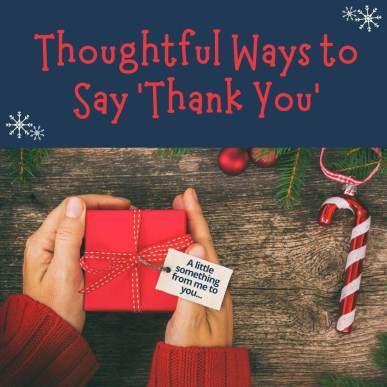
The reality is that this is a tough business. There’s so much to it beyond writing and no matter how much knowledge and education you may have, at the end of the day there’s a lot of experimentation on what works and what doesn’t.
Succeeding (and staying sane) often comes down to our ability to reach out to others and the kindness of those people to share what they have discovered so we can weigh that experience against our own journey.
It doesn’t matter who you are…chances are, others helped you to this point and will continue to help you grow and thrive. And this is why the writing community is such a great place…it’s full of people who understand it’s easier to learn from one another and succeed together.
It feels good to say Thank YouSo I put together a list of ways to do that which won’t break the bank. I hope you get some good ideas here!
Free Gifts for WritersAn encouraging note. Sometimes the only thing that keeps us going is a kind word at just the right time. A facebook post. A tweet. An email. Public or private, let someone know how much you have enjoyed working with them this year and that you appreciate them.
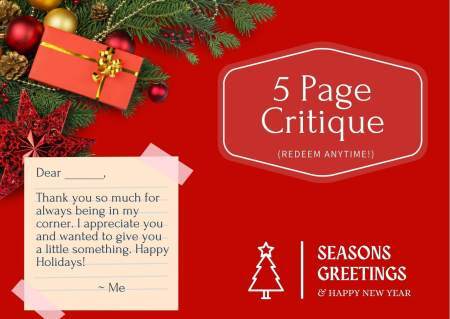
A beta read or chapter critique. Feedback is what we all need but it can be intimidating to ask. If there’s someone who has really helped and supported you, why not tell them you’d like to gift them some feedback? You can even create a certificate, like this one I created with Canva. Canva is free to use…just go here to grab the template!
A book review. If you’re like me, your time is constantly being swallowed by other things. If book reviews are something you always mean to get around to doing but forget, take a few moments to visit the books you love and leave some words on Amazon or other e-tailers. It helps so much. Then tag the author online so they know!
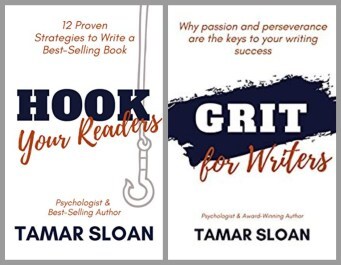
A pair of free writing how-to ebooks.
Tamar Sloan was a Resident Writing Coach here at Writers Helping Writers and she’s created two writing guides that can be downloaded for free.
This pair is packed with value, perfect for reading over the holiday break.
The gift of your time & book love.

All writers are trying to get exposure for their blog and books. If you’ve read someone’s book and enjoyed it, review it. Then go a step further and visit Amazon and upvote all their positive reviews. This helps them ensure the best reviews rise to the top. This is especially important if they have 1-star reviews for things outside their control, like the fact that a book arrived damaged, the buyer didn’t read the back jacket copy and so ended up getting a story they didn’t expect, or left a review even though they didn’t read the book. These things happen and there’s little an author can do.
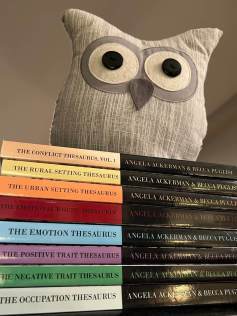
A Show, Don’t Tell Pro Pack.
We’ve put together a Show-Don’t-Tell Pro Pack that contains a sample entry from all of our writing guides, plus helpful tips and links to some of our best show-don’t-tell articles.
If you know someone who struggles with description, this will get them thinking differently about what they should describe and why.
Gifts Under $5 for WritersIf you don’t mind spending a little, here are some of our top picks.
(may contain affiliate links, but we stand behind all these suggestions)
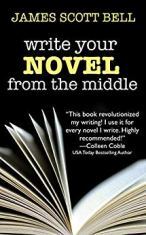
James Scott Bell’s Write from the Middle writing guide ($4.99). This is a thoughtful digital gift for any writer that struggles at the novel’s midpoint. My favorite “mini-guide” from Jim, hands down.
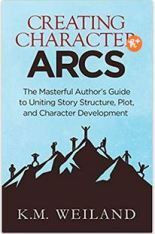
K.M.Weiland’s Creating Character Arcs writing guide ($3.99). All of Katie’s books are great, but I am particularly fond of this one because so many writers struggle with Character Arcs and it digs into what they are and how to create them in a straightforward way.
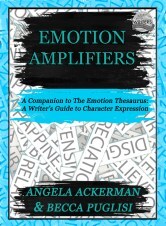
Our Emotion Amplifiers ($2.99) is an ebooklet companion to The Emotion Thesaurus, and contains body language, thoughts, and visceral sensations for what some call “near emotions” (stress, boredom, pain, attraction, etc.). It’s full of ideas on how amplifiers can unbalance your character’s emotions so they make more mistakes, creating conflict!
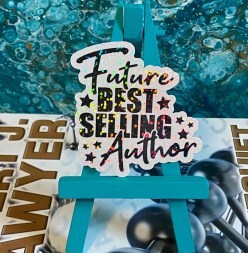
A Special, “Just for Writers” Etsy Gift
Avery Olive create a ton of wonderful things for writers – custom stickers for laptops, door hangers, book ornaments, swag, and more, many which are under $5 each.
A One Stop for Writers Gift Certificate!
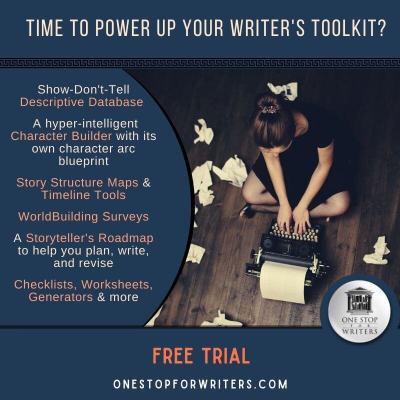
Becca and I have one job: to create high quality & extremely helpful resources for writers. Six years ago, we launched One Stop for Writers, a portal to innovative, one-of-a-kind tools and resources that help creatives write exceptional stories.
The incredible resources you’ll find at One Stop not only help people brainstorm fresh ideas, stay organized, and activate every storytelling element so the power of their fiction is magnified…they also hone their writing skills as they go.
So if you know someone who wants to create stunning plots, compelling characters, and worlds their readers won’t want to leave, be a superhero and pick them up a 1-month subscription gift certificate for HALF PRICE ($4.50)
Need more ideas?Think about what you would view as a thoughtful token. Chances are, what appeals to you will also appeal to others.
The post Free & Nearly-Free Thank You Gifts to Give Other Writers appeared first on WRITERS HELPING WRITERS��.
Use Awe to Spark Creativity
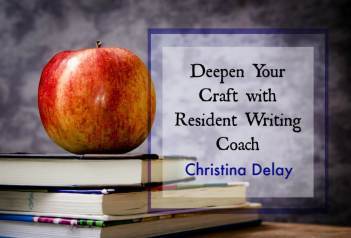
By Christina Delay
Awe is Integral to CreativityUnless you���re a full-time author, finding time and/or motivation to write can be challenging. So, finding time to boost your creativity at the expense of your writing time…crazy talk.
But…
What if I told you that staring at a dark sky full of stars was integral to your creativity?
What if I told you that watching a video celebrating human ingenuity was as important as getting words on the page?
What if I told you that you absolutely should listen to that amazing album by your favorite band and not write?
What if doing all these things made you more creatively productive?
I know. Crazy.
Or is it?
The Science Behind AweAwe is defined as ���an overwhelming feeling of reverence, admiration, fear, etc., produced by that which is grand, sublime, extremely powerful, or the like.���
Researchers have long believed in the power of positive feelings to impact creativity, however a study by Jia Wei Zhang proves that simply having positive emotions isn’t the biggest influence on creativity.
In order to significantly bolster our creativity, we need to experience awe.
Zhang found that ���the experience of awe can lead to an open mindset, orient people to explore, and approach experiences with unconventional perspectives���all of which are processes critical to creativity.��� (Zhang, 2017)
Even more interesting is the study found that experiencing awe is more impactful on creativity than amusement. Zhang references another study conducted in 2007 that concluded that people who relived a memory of awe, as opposed to one of happiness, ���reported being more willing to engage in a creative activity in the next hour.��� (Shiota et al., 2007)
So, there you have it. Scientific proof that experiencing awe will inspire you to write in the next hour.
If you need a short-cut to getting motivated to write…this is it.
Habitualize Experiencing AweSo how do you make a habit of something that seems spontaneous or uncontrollable?
Awe can be intentional.

We���ve all noticed a beautiful sunset. But there is a significant difference in noticing a beautiful sunset versus allowing yourself to sink into why that sunset is beautiful, to ponder all the factors that had to happen to not only create that fleeting masterpiece, but to also place you in that moment so you could experience it, and to understand that this moment will never be replicated. That you���ve experienced a once-in-a-lifetime sunset.
You do have the ability to turn simple moments into moments of awe.
In the beginning, set reminders on your phone to search for these moments. Or start your writing session with an intentional moment of awe.
Fortunately, habitualizing awe is fun, and once you get started, it’s easy to continue.
Your Awe Starter KitIf you���re someone who has a difficult time being awed, here���s a starter kit for you. Once you start making awe a normal part of your day, you���ll find your own moments and be able to create your own ���playlist of awe��� in order to kickstart your writing sessions.
 NatureSunsets/SunrisesStarry nightsLeaves blowing in the streetA flower bloomingWind blowing through the treesFamilyA child���s laughterA sleeping child (which can be many different levels of awe)Reliving their childhood through photosThe love you hold for your SO and/or childrenYour own parent’s or parental figure���s love and sacrifice for youThe ArtsVideos of your favorite type of dance (ballet, contemporary, jazz, hip hop)PoetryA beautifully written line in a bookA painting that moves something within youMusic – particularly a song that allows you to listen on a deeper levelTravelNew-to-you sightsStained glass windows in churchesA place steeped in history, which you���ve read aboutWalk in the footsteps of your ancestorsEngage with people who don���t speak your language or share your cultureHumansNew inventionsNew discoveriesTheories about ancient civilizationsVideos of the deepest parts of the oceanStories about people who overcome great odds
NatureSunsets/SunrisesStarry nightsLeaves blowing in the streetA flower bloomingWind blowing through the treesFamilyA child���s laughterA sleeping child (which can be many different levels of awe)Reliving their childhood through photosThe love you hold for your SO and/or childrenYour own parent’s or parental figure���s love and sacrifice for youThe ArtsVideos of your favorite type of dance (ballet, contemporary, jazz, hip hop)PoetryA beautifully written line in a bookA painting that moves something within youMusic – particularly a song that allows you to listen on a deeper levelTravelNew-to-you sightsStained glass windows in churchesA place steeped in history, which you���ve read aboutWalk in the footsteps of your ancestorsEngage with people who don���t speak your language or share your cultureHumansNew inventionsNew discoveriesTheories about ancient civilizationsVideos of the deepest parts of the oceanStories about people who overcome great oddsWhat about you? Do you have a moment of awe you���d like to share?
Work Cited:
Zhang, Jia Wei. Trait and State Based Experience of Awe Promotes Creativity. 2017, UC Berkeley.
EScholarship.org, https://escholarship.org/uc/item/9k10....
 Christina Delay
Christina DelayResident Writing Coach
Christina is the hostess of Cruising Writers and an award-winning psychological suspense author. She also writes award-winning supernatural suspense under the name Kris Faryn. You can find Kris at:
Bookbub �� Facebook �� Amazon �� Instagram.
The post Use Awe to Spark Creativity appeared first on WRITERS HELPING WRITERS��.
December 11, 2021
Relationship Thesaurus Entry: Parent and Adult Child
Successful stories are driven by authentic and interesting characters, so it���s important to craft them carefully. But characters don���t usually exist in a vacuum; throughout the course of your story, they���ll live, work, play, and fight with other cast members. Some of those relationships are positive and supportive, pushing the protagonist to positive growth and helping them achieve their goals. Other relationships do exactly the opposite, derailing your character���s confidence and self-worth or they cause friction and conflict that leads to fallout and disruption. Many relationships hover somewhere in the middle. A balanced story will require a mix of these dynamics.
The purpose of this thesaurus is to encourage you to explore the kinds of relationships that might be good for your story and figure out what each might look like. Think about what a character needs (good and bad), and build a network of connections for him or her that will challenge them, showcase their innermost qualities, and bind readers to their relationship trials and triumphs.
Parent and Adult Child
Description:
The parent/child relationship changes drastically as both parties reach adulthood and maturity. With perspective, the adult child may develop feelings of empathy, awe, respect, and deeper love for their parent. They may also find themselves coming to grips with a childhood of neglect, abuse, and toxicity. The parent, likewise, may navigate different feelings surrounding their adult child’s life, from pride and satisfaction to shame and guilt. With childhood being a formative time and an adult child being equipped with experience and understanding, this relationship has the potential for powerful dimension.
Relationship Dynamics
Below are a wide range of dynamics that may accompany this relationship. Use the ideas that suit your story and work best for your characters to bring about and/or resolve the necessary conflict.
Each party seeking to meet the other’s needs
The two speaking daily, vacationing together, and otherwise seeking out each other’s company
Both parties sharing in the raising of children/grandchildren
An adult child becoming a caretaker for their aging parent
One party seeking out the advice of the other
Either party striving to forgive, reconcile with, or make amends with the other
An adult child and parent who love and respect each other but aren’t very close (due to physical distance, busyness, or another benign reason)
An adult child and parent who have been driven apart by the child’s spouse or significant other
Two people who simply don’t get along (because of religious or political differences, clashing personalities, parenting styles, etc.)
An adult parent who is still trying to control or orchestrate their child’s life
A manipulative parent using a grandchild against their child to get what they want
An adult child who is still relying on their parent for their basic needs
An unreliable parent who acts more like the child in the relationship
An adult child hiding their choices from their parent and maintaining a fa��ade
A parent and child who only get together for family functions but otherwise avoid one another
A toxic relationship filled with anger, accusations, blame, and even abuse
An estranged parent and child
An adult child being unable to forgive a parent for past transgressions
An adult child being treated differently than other siblings by their parent
One party being predominantly selfish and seeking their own needs above the other person’s
Challenges That Could Threaten The Status Quo
The child wanting to revisit unaddressed childhood trauma
The parent relocating closer to or further away from the child
The parent disapproving of their child���s lifestyle choices
The child facing a challenge that requires additional time or financial support from the parent
The parent disapproving of the adult child’s parenting philosophies
The child rejecting cultural or religious norms that the parent still embraces
The child finding out they have been lied to about their parentage
One party making a choice that brings shame to the family
One person’s addiction escalating so it impacts others
The parent divorcing
A single parent remarrying
Either party developing a serious illness
One person needing to borrow money from the other
Either party needing to move in with the other
The child setting healthy boundaries that the parent doesn’t agree with
Conflicting Desires That Can Impair the Relationship
The child wanting to reveal a long-held family secret
One party wanting more contact than the other
The adult seeking autonomy from a parent who wants to maintain control
The parent wanting their adult child to get married or have children before they’re ready
The parent entering into a romantic relationship that the child disapproves of
A parent wanting their child to conform to cultural norms or religious beliefs
The child wanting a reluctant parent to seek help for addiction or a medical affliction
The child wanting an abusive or neglectful parent to admit fault
The child wanting more insight into their parent���s past than the parent is comfortable sharing
A parent wanting their adult child to pursue a different career path
Clashing Personality Trait Combinations
Needy and Independent, Independent and Controlling, Confrontational and Timid, Nurturing and Withdrawn, Ambitious and Lazy, Responsible and Scatterbrained, Responsible and Irresponsible
Negative Outcomes of Friction
Strained social interactions
Other family members being caught in the middle
Feelings of self-doubt and insecurity
Secrets being kept that really should be shared
Arguments and fights
Either person feeling invalidated and unsupported
Abusive or toxic behavior leading to trauma
Difficulty setting or respecting boundaries
Losing the chance to be mentored through difficult times
A grandparent having no relationship with their grandchildren
Estrangement
Fictional Scenarios That Could Turn These Characters into Allies
Uniting to stand up to a difficult family member or outsider
The parent inviting the adult child into the family business
Coming together to support the needs of another loved one
Taking a trip together
Attending therapy together
Both parties needing to share in the raising of a child
The parent supporting and guiding their adult child through a challenging time
The adult child gaining new perspective and empathy for their parent when they have kids of their own
Ways This Relationship May Lead to Positive Change
Learning and growing from one another���s perspectives and experiences
An adult child receiving recognition for their accomplishments from their parent
Either party maturing and realizing the part they played in a dysfunctional relationship
The adult child realizing, in hindsight, the sacrifices and support of their parent
Either person learning to compromise
The relationship serving as a bridge for other strained relationships in the family
Themes and Symbols That Can Be Explored through This Relationship
A fall from grace, Alienation, Beginnings, Betrayal, Coming of age, Deception, Depression, Family, Friendship, Hope, Illness, Inflexibility, Innocence, Instability, Isolation, Journeys, Loss, Love, Mystery, Passage of time, Rebellion, Recognition, Sacrifice, Suffering, Unity
Other Relationship Thesaurus entries can be found here.
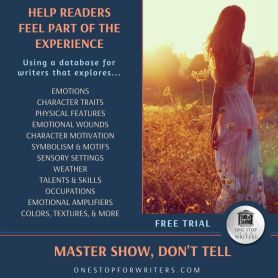 Need More Descriptive Help?
Need More Descriptive Help?While this thesaurus is still being developed, the rest of our descriptive collection (15 unique thesauri and growing) is accessible through the One Stop for Writers THESAURUS database.
If you like, swing by and check out the video walkthrough, and then give our Free Trial a spin.
The post Relationship Thesaurus Entry: Parent and Adult Child appeared first on WRITERS HELPING WRITERS��.
Writers Helping Writers
- Angela Ackerman's profile
- 1014 followers



